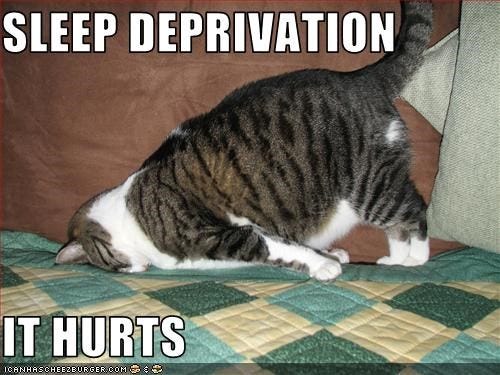So What, Who Cares (vol 2, issue 2) Why you should kick your smartphone out of the bedroom
Hello! I was hoping to find some compelling-yet-obscure holiday we could all celebrate today, but I'm not quite sure whether National Tempura Day would do it for anyone. Yes? No? Weigh in via email or Twitter.
*
Do you want to sleep better? Then get the electronics out of the bedroom. That advice goes for all ages -- NPR just ran a report on a Pediatrics study of 2,048 racially diverse fourth-graders and seventh-graders, and the children who slept with their smartphone or iPod nearby got less sleep and self-reported poorer sleep quality. The children who slept near a television also reported getting less sleep than their screen-free counterparts, but their overall sleep quality wasn't as severely diminished as those kids who slept with mobile devices.

Because the study wasn't constructed to figure out why sleep loss was happening or what was happening with the phones to make the sleep loss so dramatic, researchers have no explanation for why smartphones hurt sleep so much more than TV does. But the results remain, and they're adding to a growing body of evidence that smartphones are bad for our sleep quality.
(Interesting how this research is growing as the market for smartphone apps monitoring sleep quality is taking off too.)
So what? If personal technology is jacking up our sleep, the effects ripple out in a variety of ways. As New York reported:
A study from Rensselaer Polytechnic Institute, for instance, has shown that spending two hours in front of a “back-lit” electronic gadget (like an iPad or a laptop — anything emitting blue light, essentially) suppresses the production of melatonin, the hormone regulating our circadian rhythms, by about 22 percent. This deficit can in turn lead to delayed sleep, disrupted sleep, early waking times — you name it.
And disrupted sleep often leads to weight gain: Exhausted bodies produce more of ghrelin (the hormone that tells us to eat) and less leptin (the hormone that tells us to stop), and sleep deprivation kneecaps your prefrontal cortex (vol 1, issue 62) -- i.e. the part of the brain that governs our capacity for self control.
In addition to the metabolic chaos that results from chronic sleep disruption/deprivation, there's a lot of cognitive impairment. As reported in the New York Times:
While our brains can recover quite readily from short-term sleep loss, chronic prolonged wakefulness and sleep disruption stresses the brain’s metabolism. The result is the degeneration of key neurons involved in alertness and proper cortical function and a buildup of proteins associated with aging and neural degeneration.

In other words, our short-term memory goes (sleep is vital for forming and consolidating memories), our ability to make new neural connections goes, and we raise our risks for Parkinson's and Alzheimer's.
Who cares? Presumably, those of us who want to stay somewhat healthy. In addition to the risks listed above, a lack of sleep can suppress the immune system, boost the risks of heart disease, high blood pressure, diabetes, metabolic syndrome, and some cancers, and exacerbate existing mental health conditions.
It might be worth revisiting the notion of technology sabbaticals (vol 1, issue 12) if it means better sleep and better health in the long run. Remember -- more sleep makes you a more ethical person too (vol 1, issue 1).
Extra reading: Nancy Kress's novella -- note how I emphasize novella -- Beggars in Spain is about the societal upheaval that results once the rich and famous begin bioengineering their children so they need never sleep again. It's about 20 years old at this point, but Kress's insights on the outsized impact sleep has on human culture are especially prescient, especially when you read the New Yorker's take on Soylent and come across this passage:
You begin to realize how much of your day revolves around food. Meals provide punctuation to our lives: we’re constantly recovering from them, anticipating them, riding the emotional ups and downs of a good or a bad sandwich. With a bottle of Soylent on your desk, time stretches before you, featureless and a little sad.
Anyway, Kress was saying this about life for the sleepless twenty years ago. She's devoted a fairly stellar career to writing about biological disruption and how it creates or exacerbates societal inequality, and Beggars In Spain is an excellent introduction if you're not familiar with her.
*
Your pop culture note of the day: I was a tad distracted at preschool pick-up this evening because I was singing to myself, "I hurt the gingerbread boy/ 'cause he's pretend-bread boy to me/ little cookie man never waved to me/ so he got knocked out/ because I flow!"

If this word salad is familiar to you, you're probably already singing, "La jiggy dar dar doo." And if few of the preceding words made sense, it's time for you to become acquainted with the YouTube channel Bad Lip Reading. The premise is simple: Some anonymous person is taking clips from popular movies, TV shows and music videos, then rewriting the dialogue based on what it looks like the characters are saying.
I enjoy the Walking Dead recap for season four, "MORE WALKING (AND TALKING) DEAD: PART 1," which features conversations about sensitive turtles, why dolphins aren't the same as apples, and a rap breaking it all down at the end.
However, the two that have me reliably in stitches are the ones for the Hunger Games: Catching Fire movie ("I sing when I eat fruit" gets me every time) and the Game of Thrones re-cut as a 1980s comedy about a medieval theme park, MEDIEVAL LAND FUN-TIME WORLD.
Anyway, the channel's great for those times when you desperately need a quick laugh -- or a way to needle the way too serious TV or movie fan in your life.
*
Did you miss an issue of So What, Who Cares? The archive is here. Are there typos? I apologize in advance.
As always, I welcome your feedback and suggestions via email or Twitter. Always let me know what you think about So What, Who Cares? If you really like it, tell a friend to subscribe.

